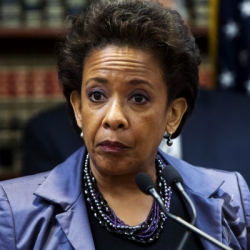Loretta Lynch, President Obama’s nominee for the United States’ next attorney general, might soon have to give her views on illegal gambling. That’s what will happen if the American Gaming Association has its way.
Judge Lynch is scheduled to appear before the Senate Judiciary Committee for confirmation hearings on January 28. When she does, Loretta Lynch will answer a bevy of questions on her philosophical and legal views on American hot topic issues.
How Senate Questioning Works
The senators on the Judiciary Committee each will receive time to ask questions of the nominee, who is in line to run the powerful Justice Department. The Justice Department runs the U.S. federal court system, including its prosecutors office. The Attorney General appoints federal judges. The Justice Department also oversees important law enforcement offices, such as the Federal Bureau of Investigation or FBI.
AGA Letter to Grassley and Leahy
Geoff Freeman, the President of the AGA, wrote a letter to SJC Chairman Chuck Grassley (R-Iowa) and the ranking Democratic member Patrick Leahy (D-Vermont). In the letter, Freeman asked both senators to ask gambling-related questions to the nominee, reminding the lawmakers to “bear in mind the important role of the Department of Justice in cracking down on illegal gambling activities.”
Freeman also asked the veteran politicians to “ensure that the next attorney general takes seriously the problem of illegal gambling across the country.”
Geoff Freeman’s Motivations
The AGA wants to see sports betting legalized, licensed, and regulated in the United States. Freeman used the upcoming Super Bowl to point out that the current federal ban on illegal gambling has been a huge boon for the criminal underworld, which monopolizes sports betting in the United States.
According to estimates Freeman cited in his letter, that Super Bowl will generate $3.8 billion in illegal wagers this weekend. That is roughly 38 times the amount Las Vegas sportsbooks are likely to generate through legal bets. The implication is, if the USA had legal sportsbooks in most of its 50 states (as it has lotto vendors and land casinos), then most of the sports wagers would be handled through legal, licensed, regulated, and taxed casino sportsbooks.
Why Regulation Is Needed
Such a framework would protect American sports gamblers, while providing much-needed gaming revenues for the states which allowed such betting. And all of that activity is already going on now, though the U.S. and state government see now advantage from that $3.8 billion in gaming action–it’s hidden from the IRS and local tax collectors.
The letter does not mention online gambling, though it is a topic of equal interest to the Department of Justice. It is the DoJ which gave a controversial 2011 opinion which opened up online gambling as a possibility for state governments. In late 2011, the states of New York and Illinois asked the Department of Justice for its opinion of whether online casinos and poker rooms were illegal under the wording of the 2006 UIGEA and the 1961 Wire Act. The Justice Department replied that such activities were not illegal–that only online sports betting was.
Legalized Online Gambling
That opened the door for New Jersey, Nevada, and Delaware to legalize sports betting and tax the proceeds. Now, nearly a dozen states are considering the legalization and licensing of online gaming sites, usually tied to the state’s already-existing licensed land-based casino industry. News reports have indicated politicians in California, Pennsylvania, Illinois, New York, Massachusetts, Mississippi, Indiana, and Washington have all discussed legalizing sports gambling, at one time or another. The chances those states will license iGaming is lesser or greater depending on the states mentioned, but it’s almost certain more states will legalize online casinos or poker rooms (or both) in the next year or two. It is a growing issue in the United States–and one the AGA believes should be discussed by the next attorney general.
The Post of Attorney General
Those outside of the United States might be wondering what the post of Attorney General is. The post of Attorney General was created by the Judiciary Act of 1789. The first AG, chosen by George Washington, was the influential Virginian, Edmund Randolph. Randolph went on to become the 2nd Secretary of State (after Thomas Jefferson). The Department of Justice, which serves the Attorney General, was not created until 1870, by President Ulysses S. Grant. As a sign of its relative importance in the ranking of cabinet positions, the Attorney General is 7th in line to become U.S. president, in case of disaster: behind only the Vice President, Speaker of the House, President of the Senate, Secretary of State, Secretary of the Treasury, and Secretary of Defense.
The AG is the president’s chief legal counsel and the chief executive of the US federal government’s law enforcement structure. While the U.S. Supreme Court represents the judicial wing of government, the Justice Department represents the prosecutorial and investigative wing of the executive branch’s (president’s) legal wing. The Attorney General is appointed by the US president and approved by the US senate. While the nomination process is usually a formality, that is not always the case. Robert Bork, a respected legal scholar who subsequently influenced anti-trust laws in the United States, was rejected by the Senate as a Supreme Court nominee.
Non-American Equivalents
People in other countries would see the Attorney General’s equivalent in the Lord Chancellor and Secretary of State for Justice in the United Kingdom. A chancellor in other countries would fill the role of the Attorney General. In some countries, the Minister of the Interior would fill the same role, though the Interior Minister is the head of secret police in certain less democratic countries.

